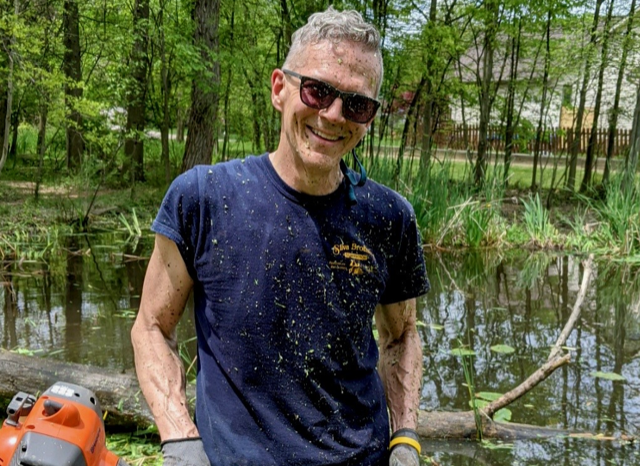Muck [muhk], noun, moist farmyard dung, decaying vegetable matter, etc.; manure; a highly organic, dark or black soil; mire; mud. From 1200–50; Middle English muc, muk <<Old Norse myki cow dung
Say WHAT??
When we moved to a new home in 2016, we inherited a large, reed-infested marshy pond that had been neglected for 30 years. We mostly avoided it because the area was choked with brambles and was clearly going to be an enormous project, not a priority.

Four years and a pandemic later we decided, “it’s time,” and committed to resurrecting our pond.
Have you ever mucked out, well, anything? Neither had we! Turns out it is stinking hard physical work. Nature conspires to cut and tear at you (thorns!) or suck you down (muddy sinkholes!) and in many ways defend itself (poison ivy!).
As we’ve–literally–hacked our way into the bramble and weeds and cleared what was choking the pond, we’ve begun to experience Nature’s more beautiful and serene side. Sun-starved saplings have blossomed as we’ve cut back the brush and dead wood. The kids got to see goslings and ducklings cruising about with their parents and saw their first tadpoles. Birds and frogs play a chorus at all hours.
What’s Mine to Learn, Here?
Wading about in thigh-deep, thick black sediment, I had much time to think (because one does not take a $1000 iPhone into the muck!). The Life and Leadership metaphors arose as thick and obvious as the muck itself. Let’s read on!
Leadership Lessons Learned From Pond Mucking
- You need the right tools to get the work done. We began from a belief we had what we needed. We are four smart people with rakes and shovels, right? Not so much. Within a week we owned two, meter-wide muck rakes and a deadly weed-hacking tool called a Pond Razor. Scary.
Leadership Lesson: You don’t know what you don’t know, and what you don’t know is a lot. If what you are doing now is not working, consider you may need a different approach, new tools, and insight from people more expert than you.
- One person’s weeds are another person’s flowers. We discovered one of our neighbors has a huge bed of curated irises that 60 meters away in our pond are an invasive weed. There’s no right or wrong, here – it’s all about location and context.
Leadership Lesson: Seek to understand, then be understood. Covey’s Fifth Habit (7 Habits of Highly Effective People) is as powerful today as in 1980: before you judge, learn how others view the world, and don’t assume your way of seeing things is the Truth or the only valid point of view.
- First, you’ve got to clear the bramble. My arms sport many bloody scratches from tearing out decades of thorny brush. To clear a path and reveal the beauty of the space we had to remove what got in the way.
Leadership Lesson: Declare and hold a clear focus. Adaptability is critical to success, but there’s a thin line between flexible and frantic. Ask around: do you have a reputation for being a “crisis of the month” manager? Stop getting in your own way. Consider how you might more clearly communicate the central, unchanging values/vision that underly your actions.
- When you’re stuck in the muck, stop to breathe. When I’m in the water in my waders I never know how deep I’ll sink with the next step. The first few times I got trapped in mid-thigh muck, I panicked. I learned to pause and breathe, relaxing into slow and deliberate movement, for that is the only way to release the suction.
Leadership Lesson: Practice self-awareness and emotional self-management. You WILL get sucked into emotional sink holes and crises occasionally, but you can’t help anyone if you wallow in the muck of despair with the others. Nurture a breath or mindfulness practice that will equip you to slow down and reconnect with your grounded, confident self.
- Pain is a sign of progress, not a signal to stop. Mucking engages muscles in every part of the body to hack, saw, rake, lift, load, and transport the stuff. Even though my body is generally strong and flexible in the gym, there were days when I literally could not move after a mucking shift. Funny thing: every weekend I get more done and recover faster as my body adapts, a great reminder that pain is a sign of muscles breaking down and rebuilding.
Leadership Lesson: Continually stretch into discomfort. The best and deepest learning occurs when you try something new and make mistakes. Trust that no matter how much it hurts or is uncomfortable, you will recover and be stronger and better at it. That’s called Wisdom and Experience (from the Latin, expireri, to try, test, the same root as Experiment).
- It’s a never-ending project. No matter how much muck we remove, there will be new muck. Oh, sure, we can convince ourselves that we will be “done” by the end of this summer, but we cannot stop the cycle of birth, death, and decay that accumulates in our pond.
Leadership and Life Lesson: YOU are a never-ending project. No matter how skilled or experienced you become — or how happy or trapped or stable or stuck you feel – you will always be evolving, shedding some “muck” from your present that no longer serves you in the future. You don’t think this is true, but it is. It’s called the End of History Illusion (Wiki entry here, 4 minute TED talk here)
That’s why leadership and personal development are considered processes vs specific places.
It’s why the Pursuit of Happiness is a way to travel, not a destination.
And it’s why true Masters, in any domain, never stop learning new habits and dropping old ones.
